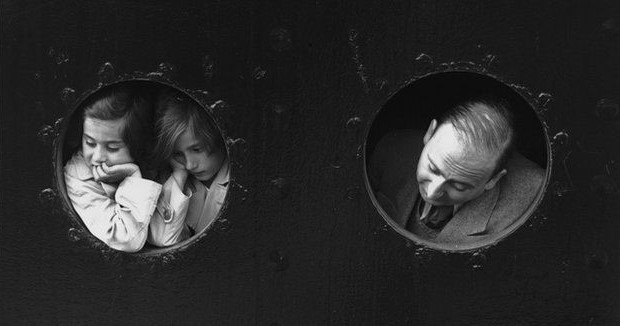GVSU to host U.S. Holocaust Memorial Museum lecturer

GVL / Courtesy – Rob Franciosi Jewish refugees look outside from within the S.S. St. Louis.
Oct 17, 2016
From Irish citizens escaping their country due to a devastating potato famine to the droves of families fleeing conflict-ridden areas in Bhutan and Syria, refugees have been an important part of the world’s history.
A segment of history’s asylum seekers – European Jews during World War II – will be the subject of a talk Monday, Oct. 24 at 4:30 p.m. in the Mary Idema Pew Library at Grand Valley State University’s in relation to Syrian refugees.
Led by Diane Afoumado, the chief of research and reference branch at the Holocaust Survivors and Victims Resource Center at the U.S. Holocaust Memorial Museum, the talk will focus on how in 1939, more than 900 German and Austrian Jews boarded the S.S. St. Louis in order to escape Nazi persecution.
While most of the passengers on the St. Louis had legal documents in Havana, complications arose when both Cuba and the U.S. refused the group entry into their countries, forcing the boat back to Europe.
“The reason why I talk about the St. Louis is (because it’s) a symbol of other Jewish refugees who wanted to find a safe haven,” Afoumado said. “You can basically write about different subjects related to the St. Louis and see that it is central to (the) study of other refugee stories.”
Rob Franciosi, a GVSU English professor whose research centers on American cultural responses to the Holocaust, will be hosting Afoumado during her visit at GVSU.
While the talk is primarily for students who are currently taking classes within the Holocaust education program, the event is open for anyone in the GVSU community wanting more knowledge about the politics surrounding the Holocaust.
“For Americans, the Holocaust has served as a measure for absolute evil,” he said. “As the years go by, we’re even more and more tolerant of different perspectives and different positions, but there is a universal agreement that something happened, fundamentally, in the way human beings treat other.”
Further emphasizing the significance of diverse points of view, Franciosi said being able to share the testimonies from refugees – in this case those who survived the Holocaust – has made it more realistic and understandable to people.
Jason Crouthamel, a GVSU history professor whose research focuses is on memory, trauma and masculinity in Germany during the age of total war, said the talk is important in highlighting the conditions refugees face as they abandon their homelands.
Leading democracies in Europe and the U.S., he said, continue to debate on how to respond to the human catastrophe unleashed by war in the Middle East.
“Because of racism, xenophobia and indifference, the world failed to help Jewish refugees trying to escape Nazi Germany on the brink of World War II,” Crouthamel said. “That failure should be a lesson today as similar prejudices and apathy so often paralyze our response to human beings seeking refuge from war and persecution.”
While the refugee crisis continues to be a complicated topic in international politics, developing a place where both the government and public respond to international tragedies will allow movement toward change in regards to past or present refugees.
“When you go to a university, you should come away with an understanding of complicated topics,” Franciosi said. “The action can’t come without understanding, so you have to understand the forces in play in your country on whether or not to accept refugees and why.
“You either change those forces, or come up with an argument to convince people that this is the right thing to do.”

























